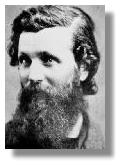Since the Scots word "muir" means a moor or a heath and there are a multiplicity of place names incorporating the word, it is not surprising that the surname is found all over Scotland. It is particularly prolific in west-central Scotland and in Orkney the name is one of the top ten most commonly found names. In the reign of King Alexander II (1214-1249) a David de More witnessed a charter in Ayrshire. A Gilchrist More incurred the wrath of Sir Walter Cumyn but later married his daughter and secured the lands of Rowallan Castle, near Kilmarnock. A descendant, Elizabeth Mure, married Robert, Steward of Scotland who later became King Robert II. In the 17th century, Sir William Mure of Rowallan was a Covenanter who had seven sons and eight daughters; his youngest son was created a baronet of Nova Scotia in 1662.
In more recent times, Thomas Muir of Huntershill was an advocate and reformer who was transported to Australia in 1794 by a legal system which was concerned that his support for the French Revolution might take root. Sir John Moore was a military commander who fought against Napoleon and fell at the Battle of Corunna in Spain in 1809.
 Pictured here is John Muir (1838-1914) who was born in Dunbar and after emigrating to the USA in 1849, not only explored the country but as a pioneer conservationist, was largely responsible for the founding of the Yosemite National Park. Alexander Muir (1830-1906) was born in Lesmahagow and after emigrating to Canada as a child, wrote the words and music of "The Maple Leaf Forever". Edwin Muir (1887-1959), a major poet of the 20th century, was born in Orkney.
Pictured here is John Muir (1838-1914) who was born in Dunbar and after emigrating to the USA in 1849, not only explored the country but as a pioneer conservationist, was largely responsible for the founding of the Yosemite National Park. Alexander Muir (1830-1906) was born in Lesmahagow and after emigrating to Canada as a child, wrote the words and music of "The Maple Leaf Forever". Edwin Muir (1887-1959), a major poet of the 20th century, was born in Orkney.
There is a Clan Muir Society Web site.
When the two spellings Moore and Muir are taken together, the name was the 24th most frequent surname at the General Register Office in 1995.



